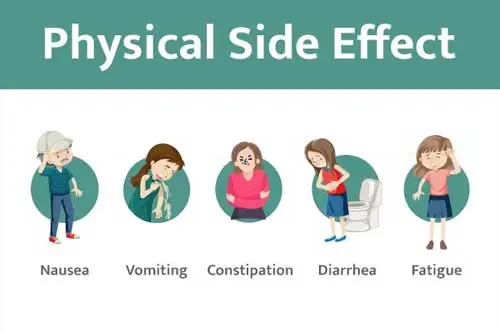Weight loss surgery, also known as bariatric surgery, offers significant benefits for individuals struggling with severe obesity. These procedures can lead to substantial weight loss and improvement in obesity-related conditions such as type 2 diabetes, hypertension, and sleep apnea. However, like any surgical intervention, weight loss surgery comes with potential side effects and risks. Understanding these side effects is crucial for anyone considering this option.
Immediate Post-Surgery Side Effects
1. Pain and Discomfort:
Post-surgical pain and discomfort are common and typically managed with medication. Patients may experience soreness at the incision sites, especially with procedures involving laparoscopic techniques.
2. Nausea and Vomiting:
Nausea and vomiting can occur shortly after surgery as the body adjusts to the changes in the digestive system. These symptoms often diminish as the body adapts to the new diet and smaller stomach capacity.
3. Infection:
Infection at the incision sites or within the abdomen is a risk with any surgical procedure. Following post-operative care instructions meticulously can help reduce this risk.
4. Blood Clots:
The formation of blood clots, particularly in the legs (deep vein thrombosis), is a serious but relatively rare complication. Early mobilization and blood-thinning medications are typically used to prevent this.
5. Swelling and Bruising:
Swelling and bruising around the incision sites are normal reactions to surgery. This discomfort usually subsides within a few days as the body begins to heal.
6. Fatigue:
Feeling tired or fatigued is typical after surgery as the body expends energy on the healing process. Adequate rest and hydration are essential during this time to support recovery.
7. Constipation or Diarrhea:
Changes in diet and reduced food intake can affect bowel movements, leading to constipation or diarrhea in some patients. Maintaining adequate hydration and following dietary guidelines can help regulate bowel function.
8. Dumping Syndrome:
Dumping syndrome occurs when food moves too quickly from the stomach into the small intestine, leading to symptoms such as nausea, sweating, and diarrhea. This condition is more common in patients who have undergone gastric bypass surgery and can usually be managed through dietary modifications.
9. Hair Loss:
Some patients may experience temporary hair loss in the months following surgery. This is often attributed to rapid weight loss and changes in nutritional intake. Hair typically regrows once weight stabilizes and nutritional deficiencies are addressed.
10. Emotional Changes:
Weight loss surgery can trigger a range of emotional responses, including feelings of excitement, anxiety, or sadness. Adjusting to physical changes and navigating the complexities of post-surgical life may contribute to emotional ups and downs. Seeking support from healthcare providers, support groups, or mental health professionals can be beneficial during this transition period.
Long-Term Side Effects
1. Nutritional Deficiencies:
Due to the reduced stomach size and, in some cases, altered absorption pathways, patients may face deficiencies in essential nutrients such as vitamins B12 and D, iron, calcium, and folate. Lifelong supplementation and regular blood tests are often required to manage these deficiencies.
2. Dumping Syndrome:
Dumping syndrome occurs when food moves too quickly from the stomach to the small intestine, causing symptoms like nausea, diarrhea, sweating, and dizziness. This is more common in gastric bypass patients and can be managed by dietary adjustments.
3. Gallstones:
Rapid weight loss can increase the risk of developing gallstones. Some patients may require medication to prevent gallstones, while others might need their gallbladder removed.
4. Bowel Obstruction:
Adhesions or internal hernias can cause bowel obstructions, leading to symptoms such as severe abdominal pain, vomiting, and constipation. This condition may require further surgical intervention.
5. Psychological Effects:
Weight loss surgery can lead to emotional and psychological changes. While many patients experience an improved quality of life and mental health, others may struggle with body image issues or the stress of adjusting to a new lifestyle. Psychological support and counseling are often beneficial.
Specific Side Effects by Procedure Type
1. Gastric Bypass Surgery:
Marginal ulcers: Ulcers can develop at the site where the stomach and intestine are joined.
Anastomotic leak: Leakage from the surgical connection between the stomach and intestine can cause severe infection and may require emergency surgery.
2. Gastric Sleeve Surgery:
Gastric leak: Leakage along the staple line where the stomach has been divided can lead to infection and requires prompt medical attention.
Strictures: Narrowing of the stomach tube can cause difficulty swallowing and may need endoscopic treatment.
3. Adjustable Gastric Banding:
Band slippage: The band can move out of place, causing vomiting and reflux.
Erosion: The band can erode into the stomach, necessitating removal.
4. Biliopancreatic Diversion with Duodenal Switch (BPD/DS):
Severe malnutrition: This procedure carries a higher risk of protein and nutrient deficiencies due to the extensive bypass of the intestines.
Chronic diarrhea: Frequent bowel movements and malabsorption are common issues.
Mitigating Risks and Managing Side Effects
1. Follow-up Care:
Regular follow-up visits with your healthcare team are essential to monitor your health, manage any side effects, and adjust your treatment plan as needed.
2. Diet and Lifestyle Changes:
Adhering to a strict post-operative diet and incorporating regular physical activity are crucial for preventing complications and ensuring long-term success.
3. Support Systems:
Joining support groups and seeking counseling can provide emotional support and practical advice from others who have undergone weight loss surgery.
4. Education and Preparation:
Understanding the potential risks and side effects, along with thorough pre-surgical preparation and education, can help set realistic expectations and prepare for any challenges.
For a more safe option you can have gastric balloon surgery in Antalya.
Continued Support and Monitoring
After weight loss surgery, ongoing support and monitoring are crucial for long-term success. This includes regular check-ups with healthcare providers, nutritional counseling, and support group participation. These resources can help individuals navigate the challenges of post-surgical life, address any side effects or complications promptly, and stay motivated on their weight loss journey.
Lifestyle Changes for Sustainable Results
Weight loss surgery is a powerful tool for jump-starting weight loss, but it’s not a standalone solution. To achieve and maintain optimal results, patients must commit to making significant lifestyle changes. This includes adopting a nutritious, portion-controlled diet, engaging in regular physical activity, managing stress, and prioritizing self-care.
Emotional and Psychological Well-being
In addition to physical changes, weight loss surgery can have a profound impact on emotional and psychological well-being. While many individuals experience improved self-esteem and confidence after surgery, others may struggle with feelings of guilt, anxiety, or depression. Seeking support from mental health professionals and participating in counseling or therapy can help address these issues and promote overall well-being.
Controlling weight loss surgery side effects
Controlling weight loss surgery side effects is crucial for ensuring a smooth recovery and optimizing long-term outcomes. While some side effects are inevitable during the initial post-operative period, there are several strategies patients can employ to manage and alleviate these symptoms effectively.
Follow Post-Operative Guidelines:
Adhering to the post-operative guidelines provided by the surgical team is paramount for minimizing side effects and promoting healing. These guidelines typically include dietary recommendations, activity restrictions, and instructions for managing medications. Patients should follow these instructions diligently and reach out to their healthcare providers if they have any concerns or questions.
Stay Hydrated:
Proper hydration is essential for recovery after weight loss surgery. Adequate fluid intake can help prevent complications such as dehydration, constipation, and urinary tract infections. Patients should aim to drink plenty of water throughout the day and avoid beverages high in sugar or caffeine, which can irritate the stomach and exacerbate side effects.
Gradually Introduce Solid Foods:
After weight loss surgery, patients undergo a staged approach to reintroducing solid foods into their diet. Starting with clear liquids and progressing to pureed, soft, and eventually solid foods allows the digestive system to adjust gradually. Rushing this process can lead to discomfort, nausea, and vomiting. Patients should follow their surgeon’s dietary recommendations and avoid foods that are difficult to digest or high in fat and sugar.
Monitor Nutritional Intake:
Weight loss surgery can impact nutrient absorption, increasing the risk of nutritional deficiencies. To mitigate this risk, patients should focus on consuming nutrient-dense foods and may require supplementation with vitamins and minerals. Regular monitoring of nutritional status through blood tests and follow-up appointments with a dietitian or healthcare provider is essential for identifying and addressing deficiencies promptly.
Incorporate Physical Activity:
Regular physical activity is beneficial for both physical and mental health following weight loss surgery. Exercise can help promote weight loss, improve muscle tone, and enhance overall well-being. Patients should gradually incorporate physical activity into their routine as tolerated, starting with low-impact exercises such as walking or swimming. Consulting with a physical therapist or exercise specialist can provide personalized guidance on safe and effective workouts.
Manage Stress and Emotional Health:
Weight loss surgery can be emotionally challenging, and patients may experience a range of feelings as they navigate physical changes and lifestyle adjustments. Practicing stress management techniques such as deep breathing, meditation, or counseling can help patients cope with emotional ups and downs. Building a strong support network of friends, family, and fellow bariatric surgery patients can also provide invaluable encouragement and understanding throughout the journey.
By proactively addressing weight loss surgery side effects and prioritizing self-care, patients can minimize discomfort, optimize their recovery, and achieve long-term success in their weight loss journey. Regular communication with healthcare providers, adherence to recommended guidelines, and a commitment to healthy lifestyle habits are essential components of effective side effect management.
Conclusion
Weight loss surgery can be a life-changing option for those struggling with severe obesity, offering significant health benefits and improved quality of life. However, it is essential to be aware of the potential side effects and risks associated with these procedures. By staying informed, following medical advice, and maintaining a healthy lifestyle, patients can navigate the complexities of post-surgical life and achieve lasting success.
While weight loss surgery side effects may seem daunting, it’s important to remember that the benefits often outweigh the risks for individuals with severe obesity. The decision to undergo bariatric surgery should be made in consultation with a qualified healthcare professional after careful consideration of individual health status, lifestyle factors, and goals.
FAQs
What are the common side effects of weight loss surgery?
Common side effects include pain and discomfort at the incision sites, nausea, vomiting, and temporary hair loss. Patients may also experience changes in bowel habits, such as constipation or diarrhea, as well as fatigue and dizziness.
How long do weight loss surgery side effects typically last?
Side effects vary depending on the type of surgery and individual factors. Many side effects, such as pain and nausea, improve within the first few weeks after surgery as the body adjusts. However, some side effects, such as hair loss or changes in bowel habits, may persist for several months before resolving.
What can I do to manage nausea and vomiting after weight loss surgery?
To manage nausea and vomiting, it’s essential to follow post-operative dietary guidelines carefully. Gradually introduce liquids and soft foods, and avoid foods that may trigger nausea, such as greasy or spicy foods. Staying hydrated and taking anti-nausea medications as prescribed by your doctor can also help alleviate symptoms.
Are there any long-term side effects of weight loss surgery?
While weight loss surgery can offer significant health benefits, there are potential long-term side effects to consider. These may include nutritional deficiencies, gallstones, and changes in bowel habits. Regular follow-up appointments with your healthcare provider and adherence to dietary and lifestyle recommendations can help mitigate these risks.
When should I seek medical attention for weight loss surgery side effects?
While some side effects are normal during the recovery period, others may indicate complications that require medical attention. Seek immediate medical attention if you experience severe or persistent abdominal pain, fever, excessive vomiting or diarrhea, difficulty breathing, or signs of infection at the incision sites. It’s important to communicate openly with your healthcare provider about any concerns or symptoms you may have after weight loss surgery.



